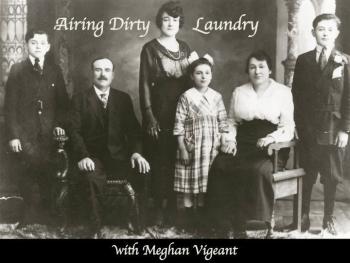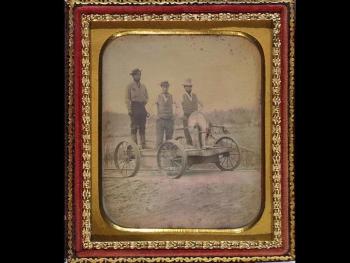Welcome to our ongoing feature Behind the Slides, where we meet up with a presenter at PechaKucha Night and find out the deeper story beneath the images the presenter chose to portray.
Meghan Vigeant was one of the presenters of PechaKucha Night, held at the Blue Goose in Northport Feb 27. Like the other presenters, she took the audience through her creative process in a visual storytelling format with a 20-second-per-image, 20-image slideshow. Meghan is a personal historian and owner of Legacy Preserves in Hope, ME. She helps people make books about their lives.
Note: Vigeant's PechaKucha slides appear in the right column. Click on the photos to match them with the actual slide notes (in italics). Beneath the slide notes will be the deeper story.
Personal histories
There was an article in the New York Times about the importance of knowing your family history. In a study at Emory University, kids who knew stories about their family had higher self-esteem. They could handle stress better.
As a personal historian I listen to people tell me their stories, type it up, edit it, add photos and make it into a book they can share with family and friends.
Three types of narratives
The article talked about three kinds of family narratives. The ascending narrative essentially goes like this: "Well, honey, our family came to this country with nothing, but look at us now." The descending narrative goes the other way round: "Kid, we had it all, then we lost everything." The Oscillating narrative: "Sweetheart, we've had our ups and downs. But we've always stuck it out as a family."
The article was followed by a lot of angry comments from folks with descending narratives who didn't want to pass on family legacies of slave-owner ancestors, or mom the alcoholic, or grandpa the child molester. (Of course, sharing these kinds of stories with children deserves careful consideration, and saved for appropriate age.) However, I would argue that both the descending and ascending narratives are incomplete. If you were to dig back far enough, wide enough, or even look at your story, I bet you will find the oscillating narrative.
My own narrative
My great-grandfather, Albert Pepin, a French-Canadian working on the railroads in the Upper Peninsula of Michigan, was probably drunk when a train ran over both of his legs. But, he survived, got two prosthetic legs, and learned how to drive. He ran for city clerk, and became a chef.
This is an example of an "oscillating narrative" from my own family.
Great Grandpa
Great Grandpa was doing quite well until he was hit again, this time by a trolley car, and was killed, leaving my great-grandmother Ida to raise their four children. Even though she only had a third grade education, she took in laundry and boarders and sent all four of her kids to college and three of them to graduate school. They went on to become a doctor, an engineer, a dietician, and a businesswoman.
My mother heard this story many times as a child, but she never understood it. They always left out the drunken part. She knew something was missing. It was only until her older brother, aired the family's dirty laundry and let her in on the secret one day that grandpa had a drinking problem.
The best part
For me, (the drunk part) that's the best part of the story. He's not just some martyr who gets run over twice in his life. He made mistakes. To me, it makes his efforts to overcome a disability all that more admirable.
Knowing both our success stories and ugly stories gives us a sense of resiliency. It helps us to see how, despite our faults, we can survive hardships and go on to thrive and laugh about it all.
The good and the bad
My recommendations to you are to find out your stories and share them, the good and the bad. Finally, make it last. Write it down or record it. Make a book or a video. Do something so that your story can be remembered and shared again.
If you're too busy or overwhelmed by the idea of finding and documenting your stories there are personal historians like myself who can help.
Meghan Vigeant is a personal historian and owner of Legacy Preserves, www.legacypreserves.com. For more information about PechaKucha visit them on Facebook.
Related story: The Way of Karate
Kay Stephens can be reached at news@penbaypilot.com

































